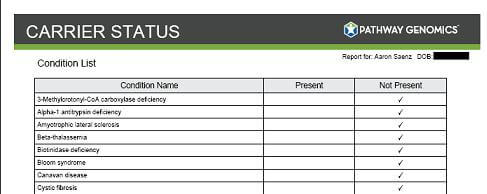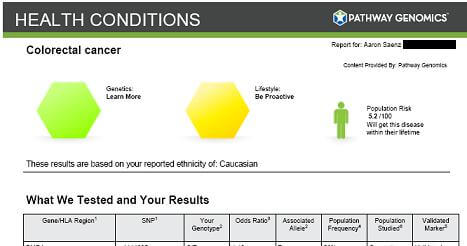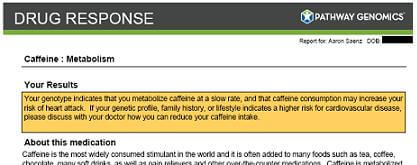Exclusive: I Already Took the DNA Test That Hits Walgreens on Friday (video)

Share
UPDATE: Walgreens has decided to postpone stocking these genetic test kits until after the FDA is finished 'discussing' legal issues with Pathway Genomics.
This Friday will see the launch of a new phenomenon: a genetic test you can buy at your local pharmacy. Walgreens will be selling the kits for Pathway Genomics personal DNA Test for around $20, and CVS is scheduled to carry them as early as August. While the kit is little more than a tube you fill with saliva, you can send it in (via FedEx) to have Pathway Genomics analyze your DNA and give you valuable information about your susceptibility to certain diseases, negative reactions you may have to certain drugs, and your genetic ancestry. You select which kinds of analysis you want performed with additional costs ranging from $80 to $250. I recently took a version of PG's personal DNA test that's identical to the one you'll find in stores on Friday. I also spoke extensively with Ed MacBean VP of product management. Keep reading for a preview of what your own experience may be like, from spitting in the tube to speaking with a genetic counselor about your results. With almost 7000 Walgreens across the US set to offer the kits, Pathway is about to make widespread retail DNA testing a reality.
Pathway Genomics performs analysis on select portions of your DNA: mostly single nucleotide polymorphisms or SNPs (pronounced 'snips'). They aren't the only company providing these tests, there's also 23andMe, Navigenics, and others in the US and around the World. SNPs are sort of like the cliff notes to your genome. They can give some important insights into certain areas, but they aren't a complete scan of your DNA. If you want the entirety of your genes analyzed you'd need whole genome sequencing which is now available commercially through both Complete Genomics and Illumina but at a considerably higher price ($10k+ or more). For most people, SNP testing provides a good access point to their DNA, especially now that it will be available at your local pharmacy.
The Test
When you purchase the personal DNA test kit (either online at PG's website or at Walgreens) you'll receive a small box with the necessary equipment to collect your DNA. It's actually very simple. This is a 'spit test', you fill a tube with your saliva and the DNA within that fluid is analyzed at PG's lab in San Diego. The following video shows my adventures with the kit:
As it mentions in the video, spitting in the tube is really the second step in the personal DNA test journey. First you have to log on to the Pathway Genomics website, register, and fill out a survey. With around 20 questions, this online survey covers your family history, personal health, and habits. This information will be used later in conjunction with your DNA to provide an assessment of your risk for diseases.
*To avoid the controversy of giving genetic tests to children - Pathway will not be offering its kits to those under 18.
The Results
A few weeks after sending in your saliva, you'll receive an email from Pathway Genomics indicating that your results are ready. By logging into the PG website you'll be able to download any and all analysis that you have purchased as a PDF. That analysis comes in two major flavors: health and ancestry. The former includes things like carrier status for diseases, genetic risks for various conditions, and likely drug reactions. You'll be able to buy each of these analysis packages separately or together. The ancestry is not going to be initially offered through the Walgreens kit, but you can always purchase it later. Let's take a look at each of these.
The easiest analysis to understand is the carrier status. Pathway looks for more than 35 diseases which have recessive inheritance. If you get two copies of the disease gene, you get the disease (more or less). But if you only have one copy of the disease gene you're just a carrier and you'd never know it...until you have kids. If your mate was also a recessive carrier then there's a chance your children will have the disease. As such, the carrier status is sort of like sifting for land mines in your DNA. Pathway gives you a brief description of each disease for which you possess the gene. Not pleasant, but something that can be very helpful when you start to plan your family. It's a fairly common use of genetic testing, and one we've seen in various forms before.

Pathway can let you know if you are a carrier for various inheritable diseases. This is the top of an excerpt from that report.
Next comes the analysis of genetic predisposition to 24 different health conditions from asthma to ulcerative colitis. What I like about Pathway Genomics' analysis is that they are very upfront with the limitations of their product. They don't try to give you some ludicrously precise number to describe your associated risk for an illness (such as "you're 75% more likely to have type I diabetes") instead, Pathway lumps results into four 'buckets'. Each bucket represents a general level of risk. If you have no genetic markers that have been shown to code for a condition, you are told to "live a healthy lifestyle." If your risk is slightly higher (a few markers) you are told to "learn more." More markers for a condition prompts a "be proactive." If your genes show a strong disposition then you should "take action."

Pathway gives you a broad idea of your risk for diseases based on your genes and lifestyle. It may seem vague, but trust me, this approach is better than hard numbers that don't really mean anything.
This is a vague way of approaching genetic risk, but right now genetic risk is itself a vague concept. Every year more genes are added to watch lists, and our understanding improves. In fact, Pathway outright labels which of its calculations are considered preliminary and which have been confirmed through multiple scientific publications. But we can't simply say that because you have one gene you are certain to contract a related condition - it's too early for that. Many different companies have used SNPs to analyze a person's risk for a disease or health condition, and faced criticism for drawing too strong of conclusions. Pathway has decided to provide you with a wealth of information, in the hopes that you and your doctor can use it to round out your healthcare. It's a little less precise, but I think it's a better approach.
Along with your genetic 'buckets', Pathway also provides you a lifestyle bucket with the same four categories that it bases on your answers to the initial online survey. This lifestyle bucket is often different than the genetic one, includes consideration for your race/ethnicity, and is meant to round out your understanding of your risk for a health condition. There's an additional fifth bucket here, "immediate attention" if you've really been living on the edge. Personally, I found these lifestyle buckets to be unhelpful. Pathway doesn't specify which answers on the questionnaire affected your lifestyle bucket so there's no clear idea of what you'd need to change to lower your risk. Also, according to Pathway, much of that risk is determined by age, gender, and race...all things you can't really affect.

Pathway can let you know which of nine drugs you may have an atypical reaction to. Turns out I shouldn't be drinking so much caffeine.
The personal DNA test can also tell you about negative responses to drugs. At the moment there are nine such drugs which have clear enough DNA links for Pathway to believe in. That's really very few, but representatives at the company said they were looking to double that number in the months ahead. In the grand scheme of things, we'll probably see handheld DNA testing devices used in many hospitals and doctors offices to screen for these responses. For now Pathway gives a brief overview of each drug, your gene variation, and what associated risks (if any) you possess. Fairly straight forward. Most of these drugs have alternatives if you are at risk for a negative response, so this test probably doesn't carry a lot of anxiety with it. Still, better to know of these risks before you are prescribed a medication than after.
SNP derived ancestry is...nebulous. I'm not sure what else to say. This is NOT a paternity test. Using genetic markers that have come to be associated with various ethnographic information, Pathway can give you some idea of where in the world (some of) your ancestors are from. There's a nifty map of where in the history of human migration your particular markers seemed to have originated. Other than that, I didn't find much to interest me here. If you were a real ancestry aficionado then you'd probably have more to enjoy. Of course, if that were the case, you'd probably have already done a lot of historical analysis which may be more meaningful than the genetic kind.
I should mention that Pathway is continually improving its understanding of genetics. Every six months or so they'll update their analysis. You can view these updates for free from your account on their website, and use your SNPs (as listed in each report) to get the most out of the new knowledge.
Be Part of the Future
Sign up to receive top stories about groundbreaking technologies and visionary thinkers from SingularityHub.


Genetic Counseling
Along with your results from Pathway Genomics, you are entitled to free genetic counseling from the company. In fact, you are encouraged to contact these counselors as soon as you receive your results. While you can do this through email, I went ahead and called San Diego. My counselor, Emily Enns was top notch. Not only did she have the right credentials (advanced degree in genetic counseling) she had a knack for explaining the test. She helps customers face bad news, like positive results for Alzheimer's markers in your DNA. She helped me understand how I could have the gene for poor caffeine metabolism (in the drug response analysis) but still down energy drinks like candy and sleep like a baby (body weight, blood sugar, fatigue, etc). When I wanted even more information, she pointed me to the Harvard Medical School database, which is accessible to PG customers and which provides much of the reference information listed in the test results.
Pathway's genetic counseling isn't unique (other companies provide the same) but it is a crucial ingredient of their "inform the customer of everything" approach to the personal DNA test. Enns was clear to point out where associated genetic risk was vague or trumped by lifestyle risk (which is fairly often). In general, SNP testing doesn't let you draw many hard conclusions, having a genetic counselor there to explain that, and to guide you to what conclusions you can reasonably draw, is a big plus.
I should point out that at the time of my test, there were only three full time counselors at Pathway Genetics. Two had masters in genetic counseling, one a MD in genetics. That's a talented bunch, but with the launch of the Walgreens test kit they'll need more manpower. VP MacBean did say that they would eventually expand as needed.
The Company and The Controversy
Overall I would rate my experience with Pathway Genomics as very positive. Part of that could be because I didn't have to pay for it, but I'd like to think it was also because they sell a good product. Many, however, have questioned what customers are really buying for themselves when they get a SNP test. Whether it's 23andMe, Navigenics, PG, or whoever, giving someone a DNA test at this point in genetic research is probably a little premature. Yes there are a few SNPs which have clear effects when found and which a customer would probably be better off for knowing, such as carrier status or drug response. Many patients, however, won't test positive for these SNPs, or will only have one or two. You'd end up paying hundreds of dollars and not learn a great deal.
Unfortunately, you might think you had learned a great deal. That's another critique of these tests, that they can promote the idea that you have increased your understanding of your own health by leaps and bounds. SNP testing, or even whole genome sequencing, is not developed enough to serve as a clear metric of your health. It's just not there yet. We can learn bits and pieces (sometimes very helpful bits and pieces) but the majority of the population is still more likely to benefit from a regular trip to the doctor than from a DNA test of any kind.
Nowhere is this better seen than in the 'health conditions' analysis which gives you risk for things like obesity and osteoarthritis. Pathway has done everything it can to approach genetic predispositions realistically. They paint broad strokes, they admit when results are preliminary, and they update their databases often. You can check in every six months and see how scientific understanding of your SNPs has changed. Pathway has even partnered with Harvard Health to keep it at the forefront of genetic understanding. However, none of this can really change the underlying fact that DNA testing is still in its infancy. We're still far from really knowing what a small increase in genetic risk for a condition actually means to a patient. Most people (those without severe genetic risk) should probably just focus on living a healthy lifestyle.
Considering these limitations it may seem surprising that Pathway is expanding to offer their services through kits sold at Walgreens and (soon) other pharmacies. Actually, it's a very savvy move. This first wave of customers will include those who are willing to pay for a little peace of mind, and a lot of satisfied curiosity. As our understanding of genetics improves, Pathway will be able to provide clearer and more precise analysis. That will attract another round of customers to the established PG brand. Very smart.
And Pathway seems agile as well. They have their own (CLIA approved) genetic testing lab, so they could conceivably provide whole genome sequencing if they chose to go that route, or they could stick with looking at individual markers. Either way they have a good deal of private funding from the Founders Fund, the Edelson Fund, WPI and private investors. Most importantly, they have a commitment to keeping themselves current.
If you had asked me a few months ago what I thought of SNP testing, I would have told you that it was likely on its way out. Whole genome sequencing is going to drop in price in the next few years and it provides a better picture of your DNA. Why get the cliff notes when the novel is almost as cheap and much more informative? Well, with Pathway's expansion into neighborhood pharmacies I have to adjust that opinion. With variable prices for customers with different interests, the retail test could attract quite a market. For now it's likely that SNP testing will continue to serve as an entry point into genetic testing for the masses. It may continue to thrive in that position, and evolve into new ones, for years to come.
That role is being examined by the FDA. Various news outlets have reported that the agency could view the test as medical procedure rather than as an informational science. MacBean was quick to point out to me, however, that the kit itself is class I exempt, and companies have been providing DNA testing for years without problems from the FDA .
Whether it proves successful or problematic, Pathway's expansion into the local retail market is a sign that the future is sure to be filled with more genetic testing. Every day sees the publication of more research which expands our understanding of how our DNA guides our risks for illness, our possibilities for achievement, and our hopes for longevity. With that increased understanding will come better personalized health opportunities, as well as new moral and political debates. The advent of genetics arrived many years ago, but this Friday may mark the first time that the average citizen may come face to face with it. Will they embrace personal DNA testing, or are we in for a long slow adoption of this powerful technology?
Image credit: Screenshot by author from Pathway Genomics
Related Articles

Researchers Break Open AI’s Black Box—and Use What They Find Inside to Control It

This Week’s Awesome Tech Stories From Around the Web (Through February 21)

What the Rise of AI Scientists May Mean for Human Research
What we’re reading